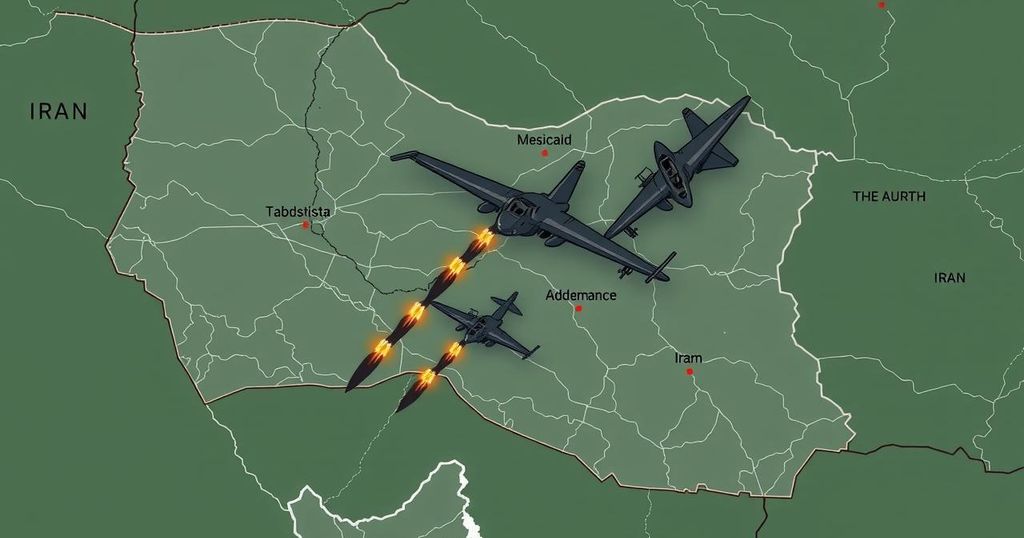U.S. Airstrikes Target Houthi Rebels Amid Rising Tensions with Iran

U.S. airstrikes targeted Houthi rebels in Yemen, destroying key military systems while raising questions about Iran’s influence. Officials reported significant military casualties without civilian losses. President Trump warned Iran would be held accountable for Houthi actions. Despite military efforts, the Houthis plan to continue attacks while Iran’s nuclear enrichment poses ongoing concerns for regional security.
Recent U.S. airstrikes targeted the Houthi rebels in Yemen, destroying more than 30 military sites, including drone, missile, and air defense systems. Despite these strikes, it remains uncertain whether the Iranian regime’s influence and resolve have been sufficiently weakened. U.S. military officials noted that while there were significant military casualties, there were no credible claims of civilian casualties as a result of the operations.
Lieutenant General Alexus Grynkewich revealed, “dozens of military casualties” were reported following an initial wave of strikes, which aimed to degrade various Houthi capabilities. These capabilities included sites for terrorist training, unmanned aerial vehicle infrastructure, and weapons production facilities. Meanwhile, the Houthis declared that their own casualties included 53 individuals, five of whom were children.
Pentagon spokesperson Sean Parnell emphasized that these strikes served to send a clear message: “If you shoot at American troops there will be consequences.” He also noted that the ongoing military action does not imply an indefinite offensive or an intention for regime change, but instead focuses on prioritizing American interests. President Trump’s statements underscored a pointed warning to Iran, asserting that it would be held accountable for Houthi retaliation.
Trump articulated on Truth Social, “Any further attack or retaliation by the ‘Houthis’ will be met with great force… Every shot fired by the Houthis will be looked upon… as being a shot fired from the weapons and leadership of IRAN, and IRAN will be held responsible.” The Houthis have indicated their plan to intensify attacks in the Red Sea in a bid to pressure Israel regarding humanitarian aid for Gaza.
Despite an earlier diplomatic overture, where Trump sought negotiations regarding nuclear discussions with Iran, the latter rejected open dialogue, angered by discussions about renewed sanctions. The effectiveness of U.S. strikes on Houthi capabilities could hinge on whether Iran continues to support the group with resources and intelligence.
Research fellow Zineb Riboua clarified that the primary objective is to dismantle sites targeting Red Sea shipping, disrupting supply chains. However, the persistence of Houthi capabilities with Iranian support remains a critical concern. Strikes have also included failures from the Houthis against U.S. naval assets in the region.
Secretary of State Marco Rubio reported that the Houthis had attacked U.S. Navy vessels nearly 174 times in the past 18 months. Major commercial shipping routes face increased dangers, affecting trade valued in the trillions. Observations indicate that current military actions differ significantly in scope and intensity from past administrations, particularly during Biden’s term.
While some military experts believe that Trump’s response to the Houthis is appropriate, others express skepticism regarding the efficacy of a military solution to ideologies, suggesting the necessity for a more comprehensive strategy toward Iran. Iran has also publicly distanced itself from the Houthis, claiming no involvement in their operational decisions, despite ongoing concerns over illicit nuclear advancements.
Currently, Iran’s uranium enrichment levels are dangerously high, reaching 60%, alarming experts about the potential for developing a nuclear weapon. While Iran maintains its position of not pursuing such ambitions, international scrutiny persists due to the lack of justification for such enriched uranium levels.
In summary, the recent U.S. strikes against the Houthis in Yemen illustrate a strong military response aimed at safeguarding American interests, while also sending a warning to Iran regarding its involvement. The situation continues to evolve, with both immediate military actions and broader geopolitical implications at play. The difference in approach under the current administration may promise more decisive actions against perceived threats, yet long-term solutions involving Iran remain complex and fraught with challenges.
Original Source: www.foxnews.com








